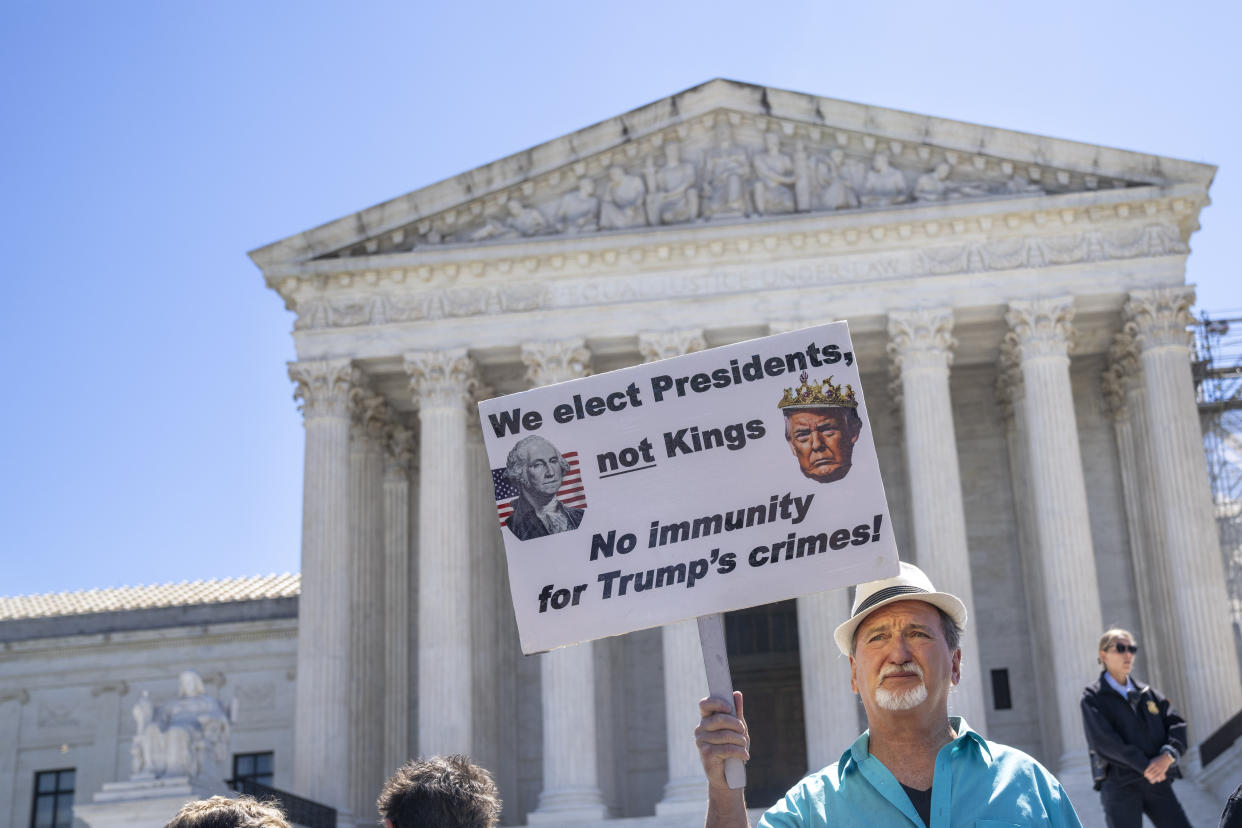3 surprising consequences of the Supreme Court’s immunity decision

- Oops!Something went wrong.Please try again later.
- Oops!Something went wrong.Please try again later.
- Oops!Something went wrong.Please try again later.
The Supreme Court’s ruling that presidents are immune from prosecution for their “official” acts will reverberate far beyond Donald Trump’s criminal case for seeking to subvert the 2020 election.
The panoply of federal and state charges Trump faces in Florida and Georgia, as well as related cases facing some of his closest White House advisers, may turn on how other judges apply the Supreme Court’s immunity decision.
And although the ruling’s most immediate impact is on the federal election case in Washington, the implications for the presidency itself — including for Joe Biden and any successors — are also likely vast.
It’s not just Trump’s DC case
Monday’s immunity decision threw an enormous wrench in special counsel Jack Smith’s bid to put Trump on trial for what Smith has described as a criminal conspiracy to overturn Biden’s victory. And Trump is certain to try to harness the ruling to derail his other cases, as well.
In Georgia, where he is similarly charged with trying to corrupt the state’s election results in 2020, Trump has previously tried to shield himself by claiming his conduct is immune from prosecution because he was acting as president. The judge in that case, Scott McAfee, has yet to rule on that effort, and now the Supreme Court may help guide his hand.
The high court left open the question of whether Trump’s efforts to pressure state officials to reverse certified election results can be treated as “official” conduct. So it’s possible the charges against Trump for urging Georgia Secretary of State Brad Raffensperger to “find” enough votes for him to prevail in the state will survive.
In Florida, where Trump is charged with hoarding classified documents in his home after leaving office, Trump has also lodged an immunity claim, contending that his decision to transfer the classified records to Mar-a-Lago in the final days of his presidency renders it protected from prosecution.
U.S. District Judge Aileen Cannon has not ruled on that motion yet but is now likely to have to contend with at least a limited impact of the Supreme Court’s decision on her case — yet another factor that could slow her already plodding timeline.
“It certainly raises whole new avenues for litigation there,” said Cardozo Law School professor Jessica Roth, a former federal prosecutor. “It certainly adds additional avenues for delay.”
And even in Trump’s New York case — where he was found guilty in May of falsifying records to cover up a hush money payment to a porn star — Trump is reportedly floating a longshot bid to reverse his conviction by citing the immunity decision. In a letter that has not been made public, his lawyers asked the judge in that case to toss out the jury verdict, the New York Times reported Monday evening.
The presidency itself is changing
The Supreme Court’s opinion extends way beyond Trump. Taken to its extreme conclusion, the court has embraced a constitutional framework that makes it nearly impossible for a president to be held legally accountable for any use of official power, no matter how nefarious — with Congress’ impeachment power being the only recourse.
“Although the Court doesn’t quite say it, the commander in chief power has to be a ‘core’ power by its logic, and so can never be a basis for a criminal prosecution,” noted Aziz Huq, a University of Chicago professor of constitutional law. “This licenses the misuse of … the surveillance and intrusive powers of the national security state.”
The decision to bless nearly all official presidential conduct as immune from prosecutorial scrutiny also has ramifications for Biden. Republicans have repeatedly suggested that their allies in government should consider charging Biden with crimes for actions ranging from his handling of the Afghanistan withdrawal to the flow of migrants over the southern border. Those policy considerations would be clearly beyond the reach of prosecutors under the Supreme Court’s analysis.
A potential boon for Trump allies
Though the Supreme Court largely left it to trial judges to determine which of Trump’s specific acts as president were “official” — and therefore immune — the justices made one exception: Trump’s conversations with Justice Department officials about how to deploy the department in service of his bid to stay in power were squarely within his official power as president, the high court declared.
That aspect of the case against Trump has been among the most vividly documented efforts to subvert the results of the election. Trump, according to numerous witnesses — including former acting attorney general Jeff Rosen and his deputy Richard Donoghue — leaned heavily on department leaders to amplify false claims of voter fraud to lend the imprimatur of the government to those allegations. When they resisted, he threatened to appoint a more like-minded ally, then-assistant attorney general Jeff Clark, to lead the department for the final weeks of his presidency.
Clark was charged alongside Trump for his alleged role in the scheme in Georgia, where Fulton County District Attorney Fani Willis brought a massive racketeering case. He was also charged by Washington bar authorities with a professional ethics violation, which could lead to the suspension or loss of his law license.
But Clark is now calling for both of those cases to be dropped in light of the Supreme Court’s ruling.
Mark Meadows, who was Trump’s White House chief of staff during the 2020 election efforts and is similarly facing criminal charges, could also try to invoke the immunity decision to derail his own charges.
Josh Gerstein contributed to this report.

